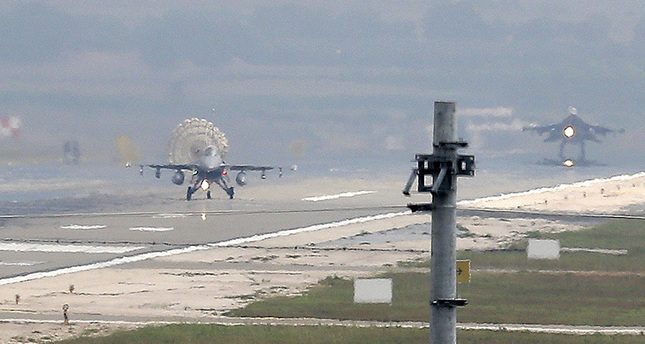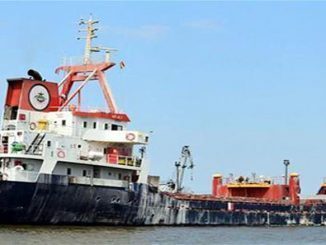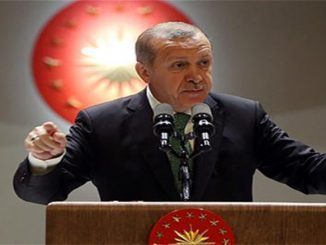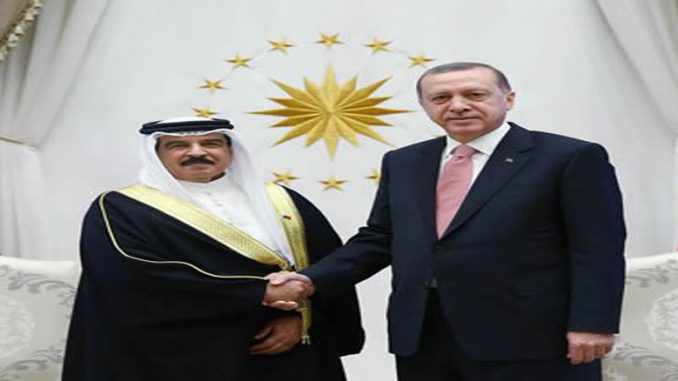
Relations between Turkey and Bahrain are progressing steadily, particularly the economic relations which are being strengthened through mutual high level official visits. Tourism, banking, agriculture, textile and construction industries sectors present promising cooperation opportunities for both countries.

Bahraini Venture Bank official:
– There will be further investment in Turkey
– We want to make new investments in health, education and food sectors
Bahrain-based Venture Capital Bank seeks investment in the health, education and food sectors in Turkey, according to the bank’s chief executive officer.
“We trust the growth potential of the Turkish economy. We want to make new investments in health, education and food sectors in Turkey in 2017,” Mohammed Janahi told Anadolu Agency on Thursday.
He said Turkey has always been on the agenda of the bank since the day it was established.
Janahi said the bank’s first move was to buy the majority of the shares of a Turkish company in 2012 that produces concentrated fruit, which he said amounted to around $300 million.
“The company’s profits have tripled since that day. We intend to expand our capacity with additional acquisitions,” he said.
Janahi said they focused on the food, education and health sectors as they are least affected sectors by everyday events in the country.
“From the beginning, we need to explain that our main goal is to establish a strategic partnership and enlarge the business,” he added.
Turkish Trade Minister meets Bahraini Minister of Commerce in Manama
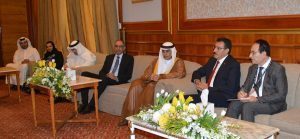
On the sideline of the second Turkey-GCC Business and Investment Forum in Bahrain early November, Bahraini Minister of Industry, Commerce and Tourism Zayed met Turkish Minister of Customs and Trade Bulent Tufenkci and his accompanying delegation.
The two ministers discussed several topics and issues between the two countries, including ways to enhance the role of the private sector in both countries and benefit from the expertise and increase existing trade volume between two countries.
The minister reviewed investment opportunities available in the Kingdom of Bahrain and soft procedures and facilities offered by the Bahrain for all investors over the world.
The meeting was attended by Undersecretary of Commerce Affairs Nader Al Moayyed, Assistant Undersecretary of Foreign Trade Eman Al Doseri and Director of Foreign Trade Relations Shaikh Hamad bin Salman bin Khalifa Al Khalifa.
During a press conference held at Bait Altijjar, the head of the Bahraini side of the Bahraini-Turkish Joint Business Council Ahmed Binhindi said, “The forum aims to strengthen economic ties between Turkey and the GCC countries, promote regional integration and diversification, and step-up investment, trade, and business activities”.
Turkish businesspeople visit Bahrain to boost relations with Gulf countries
The Union of Chambers and Commodity Exchanges of Turkey (TOBB) President Rıfat Hisarcıklıoğlu visited Bahrain with a team of businesspeople early November to improve collaboration opportunities with Gulf countries. Three hundred firms from Bahrain, the United Arab Emirates (UAE), Qatar, Kuwait, Oman and Saudi Arabia, along with 60 Turkish firms operating in these countries attended the forum, which focussed on the partnership and cooperation opportunities with the $1.7 trillion worth Gulf economy.
Hisarcıklıoğlu said in an earlier statement that, the Business Forum in Bahrain takes place in an environment where free trade talks between Turkey and the Gulf Cooperation Council (GCC) resumed, and stressed that the event was seen as an important opportunity in terms of increasing the trade with Gulf countries whose operations constructed a great economic power.
Noting that a wide range of business talks were planned among the firms under the scope of the said forum, Hisarcıklıoğlu said that sectorial sessions were also arranged in the fields of banking and finance, health, pharmaceuticals and medical equipment, renewable energy, oil and natural gas, food and food safety, transportation and logistics.
Gulf countries control 40 percent of the total global oil and financial reserves. Oil and gas-rich GCC members Bahrain, the UAE, Qatar, Kuwait, Oman and Saudi Arabia’s total Gross Domestic Product (GDP) stands at about $1.7 trillion, while the said countries’ total population is around 47 million and their national income per capita maintains a level of around $36,000.
Bahraini King paid an official visit to Turkey 3 months ago
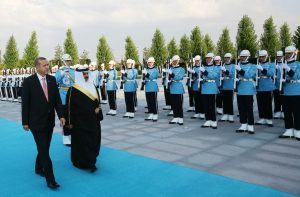
During King Hamad’s visit upon an invitation from Turkish President Recep Tayyip Erdogan, the two leaders held talks on the historic bilateral ties and means to develop cooperation in all fields, as well as discussing the latest regional and international developments.
Bahraini Information Affairs Minister Ali Bin Mohammad Al Romaihi said the visit represented “an important step to consolidate strategic relations based on mutual respect, religious and cultural links, the shared keenness on the security of the Arabian Gulf region and the rejection of foreign interference in internal affairs”.
Al Romaihi said there were ample opportunities to boost joint economic and trade cooperation between Manama and Ankara.
“The volume of trade exchanges soared from $23.2 million in 1999 to $330 million, and reached $160 million in the first half of 2016,” he said.
“Certainly His Majesty the King’s visit is very important especially during this period because my country has faced a lot of difficult times – first there were back-to-back terror attacks and lately there was the coup attempt which was a big distress that my country had to deal with,” she said. “Like any country or nation we expect to see our friends stand right beside us, and Bahrain was one of them, the first one.” Turkey’s ambassador to Bahrain Hatun Demirer said.
“The Turkish economy is steadily growing. It is the sixth largest economy in Europe and the 17th largest economy in the world. Bahrain has also immense opportunities for the business world, an on-going development programme and wide spectrum of immense opportunities. It is also one of the most business-friendly countries in this region. The aluminum sector and the petrochemical sectors are among the most advanced in the world. Ina addition, Bahrain has the best financial and banking sectors. The private sectors in the two countries should seize these opportunities,” she added.
According to official sources; Bilateral trade volume increased to 403 million USD in 2008 while almost doubling the amount compared to the previous year.
Numbers of Bahraini tourists to Turkey grow by 700%
The number of Bahraini tourists opting to visit Turkey has increased by more than 700 per cent over the last ten years, the Turkish ambassador to Bahrain has said. “We are pleased to witness the rapidly increasing touristic relations between Turkey and Bahrain which are two friendly countries with similar cultures and historical ties, in the recent years,” Hatun Demirer said. “The number of Bahraini visitors to Turkey reached 24,305 in 2014 from 3,155 in 2004. It is also a source of pride for Turkey to attract an increasing number of Bahraini nationals to buy properties in Turkey either as holiday homes or for investment purposes. This is a clear indication of the confidence of Bahrainis in Turkey’s economy and a strong sign that they feel at home in Turkey,” the ambassador said, quoted by the Bahrain News Agency (BNA).
Demirer said that Turkish Airlines has daily flights between Istanbul and Bahrain and that Turkey’s low-cost carrier company Pegasus launched its Bahrain flights on June 12 last year with three flights a week.
“Gulf Air is also operating on the same route and its has recently increased its frequency to seven flights a week. These flights are gradually pushing mutual visitors’ numbers upwards and they are clear manifestations of the keenness of both countries to enhance their tourism relations,” she said.
“Thus, the tourism field presents mutually beneficial partnership opportunities to Turkish and Bahraini private sectors. Bahrain’s focus on tourism and its drive to enhance and develop its tourism and hospitality sector as part of its economic diversification efforts means there is a great potential for cooperation with Turkey in this field,” she added.
Cooperation can be achieved mainly in terms of capacity-building, education, training and management. Tourism education and training is a well-established sector in Turkey, she added.
Ambassador Demirer said that Turkey’s tourism industry is one of the most advanced sectors in the country.
“With around 41 million tourists visiting the country in 2014, Turkey is the world’s sixth most popular tourism destination. Naturally, tourism is one of the leading sources of revenue for the Turkish economy. Our goal for the year 2023, when we will celebrate the centenary of the founding of our Republic, is to host 50 million tourists and to increase our revenues from tourism to $50 billion [Dh183 billion],” she said.
The ambassador added that tourism was among the most effective means to build robust bonds of mutual understanding, respect and friendship among nations.
“Tourism gives people the opportunity to have a first-hand and direct observation of the countries they are visiting. It also has a positive impact on international trade, as it increases public awareness of the economic strengths and potentials of other countries,” she said.
“We are also familiar with the preferences and requirements of tourists coming to Turkey from different parts of the world. In addition to being a magnet for traditional tourism, Turkey is an increasingly attractive destination for other aspects of modern tourism such as education, health and culture tourism. The improving numbers of summer camps and student exchange programmes between Turkish and foreign schools is impressively boosting youth tourism.”

